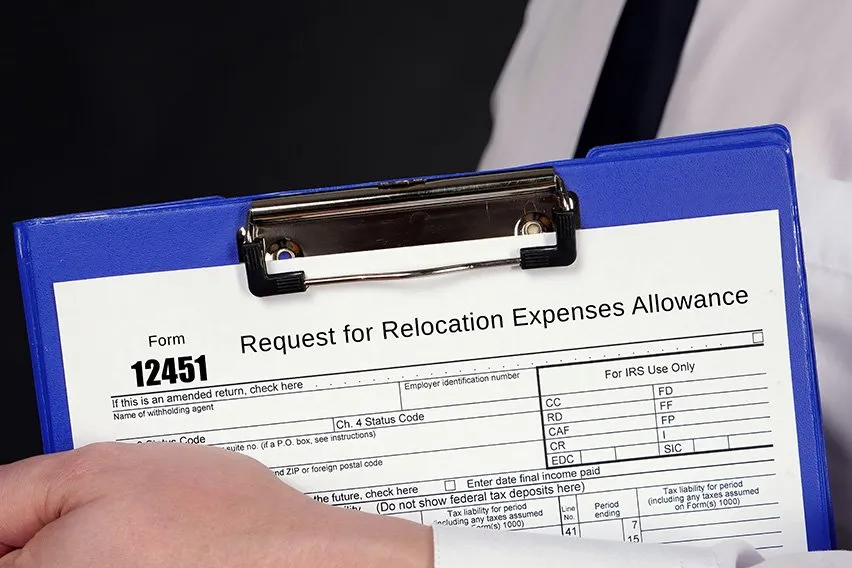Can You Write-Off Relocation Expenses? Only U.S. Armed Forces Can

With the passing of the Tax Cuts and Jobs Act in late 2017, write-offs of relocation expenses are no longer permitted as of January 1, 2025. Active duty military personnel in the U.S. Armed Forces are exempt from the Act and can still claim relocation expenses.
Here’s What We’ll Cover
Are Relocation Expenses Tax Deductible?
Are Relocation Expenses Considered Income?
Are Moving Expenses an Itemized Deduction?
How Much Tax Do You Pay on a Relocation Bonus?
What Are Deductible Military Moving Expenses?
Are Relocation Expenses Tax Deductible?
Not as of January 1, 2025.
Previously, the law allowed for tax deductions if one needed to move from their place of residence for their current employer. The criteria for the tax break involved a “distance test”: the distance between the old home and new job location must be 50 miles farther than the location of the previous workplace. The taxpayer must also start the new position and work full-time for at least 39 weeks within a year of the move.

The previous standard deductions allowed for moving expenses such as professional movers, moving van, storage unit (30 days maximum), lodging, and mileage accumulated on a personal vehicle. Airline and train tickets also previously qualified, but meals did not.
Armed forces personnel still qualify for the tax break. They also do not have to fulfill the time or distance tests. However, the move to the new location must be because of a permanent change of station and receipts must be submitted.
The spouse of a member of the Armed Forces can claim moving expenses if a move is required due to the sponsor dying, deserting or being imprisoned. The move must be back to the home of record or the sponsor’s place of enrollment in the Armed Forces.
The Tax Cuts and Jobs Acts will expire at the end of 2025. Unless further changes are made before that time, moving expenses will become tax deductible again for everybody on January 1, 2026.
Are Relocation Expenses Considered Income?
Yes, they are. An employee who receives reimbursement from an employer for professional moving fees or other expenses will need to include money received as income when filing a tax return. This applies to money paid directly from the employer to a vendor (such as a moving company) on behalf of the employee.
Because the amounts paid to the employee are considered income, then federal income taxes, Social Security and Medicare, and unemployment taxes, must be paid.
Are Moving Expenses an Itemized Deduction?
If you are an active member of the Armed Forces applying for a tax deduction on moving expenses, the expenses do not need to be fully itemized on your tax return. You will only need to account for a total of “transportation and storage” costs, and “travel”. Once tallied, these expenses will be be deducted from your gross income for the year. You will need to use IRS form 3903 to claim moving expenses, which you can access here.
How Much Tax Do You Pay on a Relocation Bonus?
Sometimes moving expenses are referred to as a ‘relocation bonus’ or ‘relocation package’. They are fully taxable as income.

What Are Deductible Military Moving Expenses?
The expenses that active Armed Forces personnel can deduct are:
- Moving Expenses:
– Packers
– Moving personnel
– Trailer or other hauler
– Storage services
– Insurance - Lodging
- Car Expenses or mileage
- Air fare
What can’t be claimed:
- Side-trips during the move (the route taken to the new home must be the shortest, most direct route).
- Pre-move house hunting expenses
- Food
- Closing costs on a home sale
- Losses on a sale of a home
RELATED ARTICLES

 How to Measure Team Effectiveness: Top 5 Ways
How to Measure Team Effectiveness: Top 5 Ways Digital Marketing for Small Businesses: the Top 5 Channels & Methods Critical for Success
Digital Marketing for Small Businesses: the Top 5 Channels & Methods Critical for Success What Is LIFO Method? Definition and Example
What Is LIFO Method? Definition and Example Tax Deductions for Daycare Business: Top 10 Deductions
Tax Deductions for Daycare Business: Top 10 Deductions Tax Deductions for Handyman Business: What You Need to Know
Tax Deductions for Handyman Business: What You Need to Know Tax Deductions for Self-Employed Workers
Tax Deductions for Self-Employed Workers